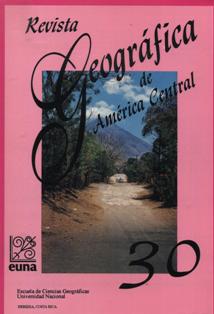ESTADO ACTUAL DE LOS SITIOS DE DISPOSICION DE DESECHOS SOLIDOS MUNICIPALES EN COSTA RICA
Keywords:
crecimiento urbano, desechos sólidos, vertederos, desechos peligrosos.Abstract
En Costa Rica como consecuencia directa del crecimiento urbano acelerado y del cambio en los hábitos de consumo de los pobladores, se da un aumento en la cantidad de desechos sólidos generados así como un cambio en la composición de los mismos, ocasionando entonces el problema de su disposición.
En el país, muchos de los sitios municipales actuales se consideran como vertederos a cielo abierto, además, se ubican de manera que afectan directa o indirectamente los cuerpos de agua (superficiales y subterráneos). Aunado a lo anterior se cuenta en la mayoría de los sitios con el problema de que no se posee control de acceso suficiente, de tal forma que existe mayor riesgo de que desechos peligrosos se depositen en ellos.
ABSTRACT
In Costa Rica, as a direct consequence of accelerated urban growth and changing consumption patterns, there has been an increase in the quantity of generated solid waste as changes in its composition, thus causing a disposal problem.
Many of the final disposal sites in the country don’t have the necessary conditions to handle these changes in quantity and quality of generated solid waste.
The majority of current municipal disposal sites are considered exposed dumps and are located where superficial and subterranean water bodies are affected. Controls to access are insufficient in the majority of the sites, thus there is greater risk that hazardous waste is deposited in them.
Downloads
How to Cite
Issue
Section
License
Proposed policy for journals offering Open Access
Authors publishing their works in the Journal acknowledge and agree to the following terms:
a) Authors retain the copyrights to their works and guarantee the Journal the right to be the first to publish their works, under the Creative Commons License Attribution-NonCommercial-ShareAlike 4.0 International, CC BY-NC-SA 4.0 International (https://creativecommons.org/licenses/by-nc-sa/4.0/deed.es), which allows others to share works upon complying with the acknowledgment of authorship and mention of the Journal as the original publisher of the work.
b) Authors are permitted to separately establish additional agreements for the non-exclusive distribution of the official edition of the work published in the Journal (for example, authors may desire to place the work in an institutional repository or incorporate it into a book that is to published elsewhere) so long they acknowledgment to recognize the Journal as the original publisher. The aforementioned additional agreements must respect the terms of the non-profit character and sharing philosophy of the original license (CC BY-NC-SA 4.0 International, https://creativecommons.org/licenses/by-nc-sa/4.0/deed.es).
c) Authors are encouraged to archive the post-print or editor/PDF version in Open Access repositories.






 REVGEO is licensed under https://creativecommons.org/licenses/by-nc-sa/4.0/deed.es
REVGEO is licensed under https://creativecommons.org/licenses/by-nc-sa/4.0/deed.es
.svg_4.png)

_(1).png)
_(1)_(1)_(1)_1.png)
(2)(1)(1)(1).png)
